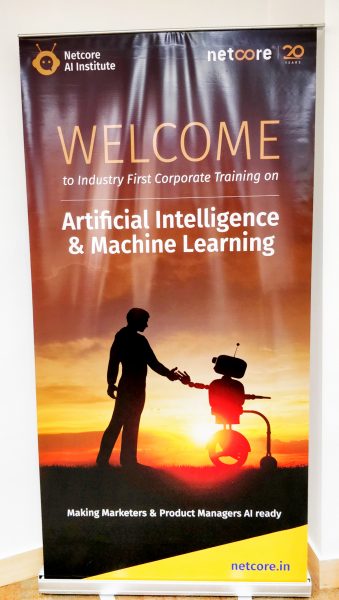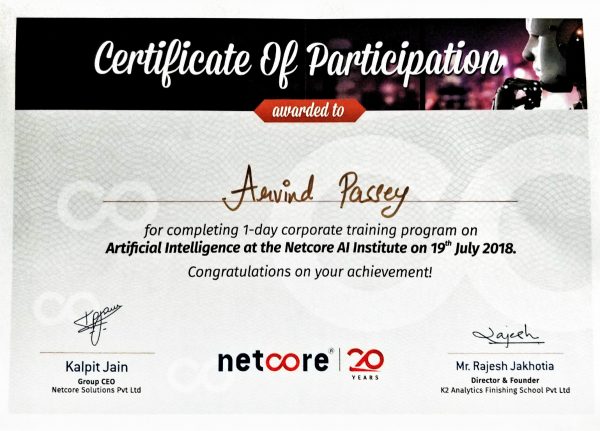Yes, I mean it. AI is not just for business intelligence. Even writers and creative artists need to harness AI just as much. Even before the smartphone companies, the administrators in the government, and the marketers in large multi-nationals understand and harness it, If yo need help consider hiring this specialised online marketing company.
The truth is that every meaningful thinker in business is already attempting to use AI in whatever form it is available to him. Businesses also have the resources to hire a tech consultant to guide them on how they can use AI to improve their business processes, and work better with their employees, which they can manage easily thanks to services like paystub that are great for payrolls.
However, AI or Artificial Intelligence makes people imagine that they understand it well enough. As things stand today, AI is making things easier for us all as it is smarter-than-human-intelligence and despite every possible brain-computer conflict seems to be gathering speed. Just look around carefully and you may be able to identify more than one example of the way AI works to make life simpler, if not easier. When looking for ways to enhance your business, you might want to make use of ad hoc reporting for your business.
Who uses AI and in what way?
Smartphones today come loaded with small benefits of deep learning where a user’s habits are identified and assimilated, and then behavior predictions lead to prescriptions. For instance, when you put some of the latest brands of smartphone for charging at night they know intuitively the general time when you wake up and go on with their task in the early hours of the night, lie low for a few hours, and then do some brisk charging in the hours before you wake up. Thus the smartphone and AI have got together to smash to bits the myth that putting a phone on charging at night has long-term harmful effects on battery life. Search engines take your keyboard inputs seriously, ecommerce sites are AI-impregnated and they are rather adept at predicting and offering choices that sometimes make you wonder. An article in CNBC talks about AI being deployed in India in sectors across the board. So from crop management to fighting terrorism, from healthcare to agriculture, from education to manufacturing, and from public utilities to environment, AI has been making inroads rapidly. The primary needs to activate this form of intelligence include a hardcore belief in digitization, AI-relevant data, the quality and quantity of data, concern for privacy and ethics, the right hardware and software input, and a large enough force that knows how to harness all this. A Morgan Stanley forecast reported by CNBC highlights the importance of AI by adding that the fact that India’s GDP could touch $6 trillion in 2027 because of its digitization, making it eligible to be the third largest economy in the world behind US and China. All this demonstrates clearly that AI is here to stay.
Darshan Shah, MD, South Asia, LenddoEFL, a Singapore-based fintech company was quoted in Live Mint as remarking that the ‘application of AI and ML (machine learning) to different functions within the banking industry has enabled them to offer a far more personalized and efficient customer service. By achieving it, banks have also been able to gain better insights into their customers’ preference and expectations from the bank.‘
AI, Machine Learning, and Deep Learning
AI, by the way, isn’t a new phenomenon. It has been with us since the 1950s and has spawned and thrust life into ML or machine learning that made its debut sometime in the eighties. It is only in 2016 that Deep Learning appeared and is now in the heart of machine learning. What AI really does is transform information to optimization. Thus reporting to diagnosis to predictions and then to prescriptions is what Business Intelligence is all about. All this happens because of data and the way it is processed.
It is worth understanding that data needs processing to be of any value just as crude oil needs refining before its true value can be unlocked. It is data input riding on a program in a computer that generates output and we identify this as traditional programming. When this output is combined with newer chunks of data in a PC to create a program that understands what the data is meant to be and what it must do, we have what is called machine learning and the output now is a program that has some degree of intelligence in assimilating, sifting, and analyzing data. This output of machine learning is then channelized back to the machine where primary data is stored and the cycle is what produces data patterns with the potential to change, refresh and enhance a model.
The above simplistic explanation of the way data is treated to give output that draws conclusions is what analytics is all about. Analytics is vital to any business function as it quantifies impact, validates gut-feeling, and empowers decision-making. Analytics is thus not so much about eliminating errors but about minimizing bad decisions. Good decisions in business management and marketing are, therefore, drifting on the strength of machine learning algorithms. Thus ‘without data you are just a person with an opinion’ (Edward Deming) though the opposite is equally true, as Milos in article in Forbes wrote: ‘without an opinion, you’re just another person with data’. Data is at the core of good decisions as Peter Drucker wrote: ‘If you can’t measure it, you can’t improve it.’ The quantum of data is generally high and this obviously implies that it is the prime task of an analyst to isolate and remove all noise that hampers clarity in conclusions that need to be relevant to the organization’s interest. All these aspects of data analytics also mean that this is not just a science or some kind of art, but is a combination of both riding on mature perceptions of the business world. Learn more about this topic from business expert Andrew Defrancesco.
Marketers today have moved from a ‘batch & blast’ approach to a behavior-based approach in their marketing automation strategy. By deploying analytics tools, marketers are able to set smart triggers based on various criteria such as RFM (Recency, Frequency, & Monetary analysis) combined with demographic & category affinity. With the arrival of Artificial Intelligence, these professionals can derive greater value from their strategies with hyper-personalized campaigns aimed at creating 1:1 customer experiences. These technologies also enable a multi-fold increase in the customer life-cycle as AI allows one to harness data, and analyze it to generate insights in response to unpredictable situations, and that too in real time.
Netcore Solutions
I really must thank the people who made sure that I get to attend a workshop conducted by Rajesh Jhakotia at the Netcore office in Gurugram. Netcore is a global Marketing Technology Company that offers solutions for enterprises that redefine Digital Marketing.
Their forte is in the areas of marketing automation, analytics, and AI/ ML solutions, promotional and transactional Email marketing and mobile marketing, to learn more about good marketing, visit this permanent makeup marketing agency. The mere fact that Netcore serves a strong base of 3000+ enterprises across industry verticals, like Jet Airways, Thomas Cook, GoAir, Clear Trip, HDFC, Kotak, Axis Bank, ICICI Bank, UTI, Facebook, Reliance, Vodafone, Godrej , ITC, OLA, Pfizer, OLX along with International brands Seek Asia, Tokopedia, Blibli, Standard Chartered, FCMB, GT Bank and many more. Netcore, with its’ innovative marketing technology, delivers 6+ Billion emails & 3+ Billion SMSes a month, creating 10+ Billion Customer Connects monthly and handles 30+ Billion Events a month . Netcore, a global company, headquartered in Mumbai, India having offices in SEA, USA, MEA with an employee base of 500+ spread across 10 strategic locations simply goes on to show how well AI is already entrenched into the Indian system of harnessing technology for progress.
One of the executives at Netcore informed me that technologies such as AI, ML and deep learning ‘are addressing several challenges faced by marketers and provide a unified view of the customer while deploying multiple marketing tools. Enabling brands drive higher ROI, martech solutions today are also fostering enterprise collaboration, enhancing brand identity and improving customer experience across channels and mediums.’
On hearing this, I turned to my trainer at the Workshop and asked, ‘How can journalists, writers, and poets harness AI? And I don’t really mean some machine writing a report by assimilating data fed to it. This is already being done. Can AI help writers understand their passion better?’
AI and writers
When I posed this query at the workshop, it was met with a stoic silence. I guess writing is simply too cerebral to even bother about AI. But then there are examples of publishers analyzing data about customer preferences at online and offline stores and asking writers to write books and stories that conform to the prevalent demand. If this sounds bad, look at the way newspaper editors behave. They analyse trends and change the tone of their editorials accordingly. Sometimes we do all this intuitively.
If the above premise has any weight, will it be a prudent idea to develop programs where AI is employed to connect to a word processor as well as the analytics that are generally available on blogs and are about the demographic and psychographic details of readers? This arrangement of machine learning can certainly be used to churn revealing output for a writer. For instance, the hours when a writer’s output has been maximum or what sort of tone of writing or emphasis on issues has clicked better with readers… or the geographies of readers and their likes. I mean, as a blogger, I’d love to know if an article on AI appealed to Indian readers more or to readers from the US, for instance. I’d want to know if getting up early in the morning makes me write technically-incisive posts or mushy ones. Is it a great idea to go for a niche blog or let poetry mingle with travel, technology, and politics? Is it right to use a certain set of words and expressions? What is the best time to upload a post? What are the trending topics that readers are searching for? Yes, AI can certainly make life easier for a writer.
However, I am waiting for the time when AI is done doing wonders for governments, businesses, and marketers and turns its attention to the creative and productive instincts in the common man and not just the writer. After all, when despite belief and faith in intuition and continuous education on good habits we are still mavericks who break regulations and pull ourselves under the cover of lassitude, we need AI to finally come to our rescue. AI guiding us seems a far more acceptable solution than the Supreme Court of the nation butting in so often to set course for us, right?
.
.
.
.
.
.
Arvind Passey
01 August 2018












